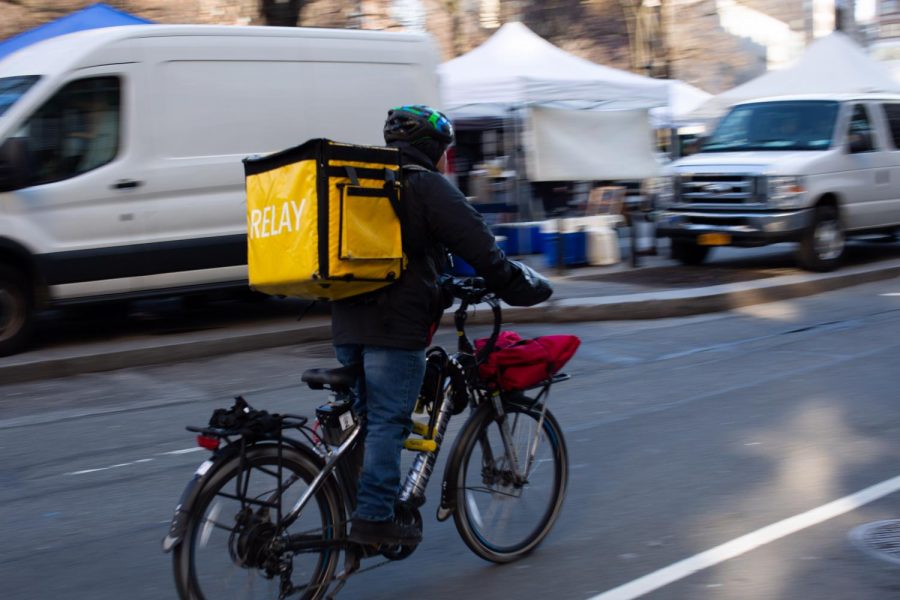The New York City Council is currently embroiled in a debate on whether or not food delivery apps should be regulated.
The pressure faced by restaurants to pay high commissions to food delivery apps has been a concern of the New York City council for a year now. Apps such as Grubhub and UberEats are charging commissions as high as 30% for their services, making it harder for small local businesses to cover costs.
Food delivery apps are an intermediary between restaurants and consumers, intended to facilitate nearly immediate food delivery or pickup.
Officials are concerned that food delivery apps like Grubhub — which had a 67% hold on the New York City food delivery market in 2019 — may exert massive market power if left unchecked. The council is debating new licensing requirements for easier surveillance of these businesses as well as capping the commission rate that delivery services can charge restaurants at 10%.
Stern professor of Business and Society Hans Taparia said the problem is complex.
“There are two sides to the story and this one bigger reality,” Taparia said. “From the delivery app perspective, their claim is that they are bringing new customers to restaurants and therefore this incremental business should not be regulated and they have some data to try and prove their case.”
He argues that restaurants are on edge giving over a slice of their slim margins to a third party.
“Restaurants are not assuming that [the apps are bringing new customers],” Taparia said. “There is only a finite amount of food that your consumers can eat and consumers are extremely price-sensitive.”
He stated that the fundamental issue is that people are not ordering enough food to sustain both restaurants and delivery apps comfortably, leaving the two in a fight for capital.
“If your price is ‘x’ and you can’t go above a certain level, there is just not enough money to go around,” Taparia said. “There is just not much revenue to go around to support both the restaurants and the delivery app profitably unless it’s a very high-value meal.”
He also blamed the concentration of similar services being offered through various platforms, making the market more competitive, a phenomenon across social media, delivery apps and online purchasing economists call the network effect.
“There is just not that much room for multiple competitors because you don’t want to have multiple apps for the same thing and you want to have all your restaurants in the same place,” Taparia said.
He added that restaurateurs are frustrated about having to go through these apps to access their consumers while also paying incredibly high commission rates.
“The restaurateurs are being forced to sell through these apps because they own many of their consumers, and so [the food delivery apps] are exerting market power and therefore charging very high commission rates to restaurateurs between 15% and 30%, and there is just not that much money to go around to make the restaurants profitable,” Taparia said.
Taparia also pointed to flaws in the way these commission rates are determined.
“Organizations like Grubhub were using algorithms, and this is so crazy, to determine how much restaurants should be paid versus actually counting the number of orders and charging at 15% or 20% commission on that,” Taparia said. “So many people who would call Grubhub would just inquire about the menu without placing an order and the restaurateur was being charged with some call that did not even result in an order.”
Last year, Grubhub pledged to pay back restaurants who were charged by the app for calls which did not result in orders following a push from the City council.
While issues of delivery services violating business ethics have been a concern for lawmakers, officials are also calling for increased investigations into the companies treatment of their independent contractors. Discussing states’ responses to these concerns, Taparia cited California passing the AB 5 Bill.
The AB 5 bill mandates gig companies, such as Uber and Lyft — which provide on-demand services through online platforms — that contract on-call and temporary workers, to provide their employees with healthcare and paid leave. Taparia said he is optimistic the council will do more to bring about similar solutions to these issues.
On Aug. 2nd, 2019, Judge Roberto Gallardo banned food delivery apps all over Buenos Aires. This legislation was prompted after a case involving 63-year-old Ernesto Floridia and his employers at Glovo — a food delivery app founded in Spain. Floridia claimed that despite being run over in an accident while delivering an order, company officials were more concerned about the condition of the product he was delivering.
London’s City Council was considering similar legislation in 2018 after receiving several complaints about couriers crowding the streets and disrupting neighborhoods.
Last year, two schools in Delaware banned students from ordering food through Grubhub and Doordash due to safety concerns warning that monitoring people conducting these deliveries as well as the products they are delivering is proving to be beyond the reach of school administrators. Several other schools across the US have followed suit.
Tisch first-year Meg Yamada agrees with the concerns that the city council wishes to address but is wary of the response it might receive.
“I personally haven’t relied too heavily on food delivery apps, but I know a lot of people who have used them a lot,” Yamada said. “Especially being college students, when you get tired of dining halls and have little time, it is very convenient to have that option.”
Email Aarushi Sharma at [email protected].


























































































































































